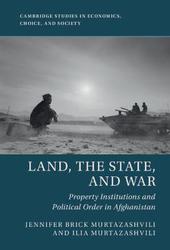
|
Land, the State, and War: Property Institutions and Political Order in Afghanistan
Hardback
Main Details
| Title |
Land, the State, and War: Property Institutions and Political Order in Afghanistan
|
| Authors and Contributors |
By (author) Jennifer Brick Murtazashvili
|
|
By (author) Ilia Murtazashvili
|
| Series | Cambridge Studies in Economics, Choice, and Society |
|---|
| Physical Properties |
| Format:Hardback | | Pages:380 | | Dimensions(mm): Height 235,Width 160 |
|
| Category/Genre | Political economy |
|---|
| ISBN/Barcode |
9781108493413
|
| Classifications | Dewey:346.5810432 |
|---|
| Audience | | Professional & Vocational | |
|---|
| Illustrations |
Worked examples or Exercises
|
|
Publishing Details |
| Publisher |
Cambridge University Press
|
| Imprint |
Cambridge University Press
|
| Publication Date |
9 September 2021 |
| Publication Country |
United Kingdom
|
Description
Although today's richest countries tend to have long histories of secure private property rights, legal-titling projects do little to improve the economic and political well-being of those in the developing world. This book employs a historical narrative based on secondary literature, fieldwork across thirty villages, and a nationally representative survey to explore how private property institutions develop, how they are maintained, and their relationship to the state and state-building within the context of Afghanistan. In this predominantly rural society, citizens cannot rely on the state to enforce their claims to ownership. Instead, they rely on community-based land registration, which has a long and stable history and is often more effective at protecting private property rights than state registration. In addition to contributing significantly to the literature on Afghanistan, this book makes a valuable contribution to the literature on property rights and state governance from the new institutional economics perspective.
Author Biography
Jennifer Brick Murtazashvili is Associate Professor in the Graduate School of Public and International Affairs, University of Pittsburgh. She is the author of Informal Order and the State in Afghanistan (2016). Ilia Murtazashvili is Associate Professor in the Graduate School of Public and International Affairs, University of Pittsburgh. He is the author of The Political Economy of the American Frontier (2013) and co-author of The Origins and Consequences of Property Rights (2020).
Reviews'Land, the State, and War makes a pioneering contribution to one of the most enduring questions in the social sciences - what are the causes of the wealth of nations? Weaving together an original theory of property rights with surveys, fieldwork, and historical analysis from Afghanistan, the Murtazashvilis shed light on why repeated efforts to establish formal property rights have failed. This book is required reading for anyone committed to the dictum, 'first, do no harm.'' Christopher Coyne, Professor of Economics, George Mason University 'Murtazshvili and Murtazshvili provide a fascinating account of the evolution of property institutions in Afghanistan. Very much in the spirit of Elinor Ostrom and Douglass North, this work uses exhaustive field work, theory, and historical analysis to reveal how formal and informal (customary) institutions work and how they interact with each other. The Afghanistan context is somewhat unique, and the authors deftly show how understanding its heavy reliance on informal institutions is important for understanding impediments to its development. This book also reveals why imposing Western-style institutions will not be a panacea for all of Afghanistan's political and economic problems. The world would be a much different place if US policy-makers had understood the insights of Murtazshvili and Murtazshvili's book prior to the 2001 invasion.' Jared Rubin, author of Rulers, Religion, and Riches: Why the West Got Rich and the Middle East Did Not 'Land, the State, and War is a fascinating account of the challenges of political and economic development in Afghanistan. Combining extensive fieldwork with a long historical narrative, this book makes a major advance in our understanding of institutions in less developed countries. In particular, the book helps make sense of property rights enforcement in places with failed and weak states. In doing so, the authors advance new arguments for the scope and robustness of self-governing institutions. An excellent read.' David Skarbek, Brown University
|